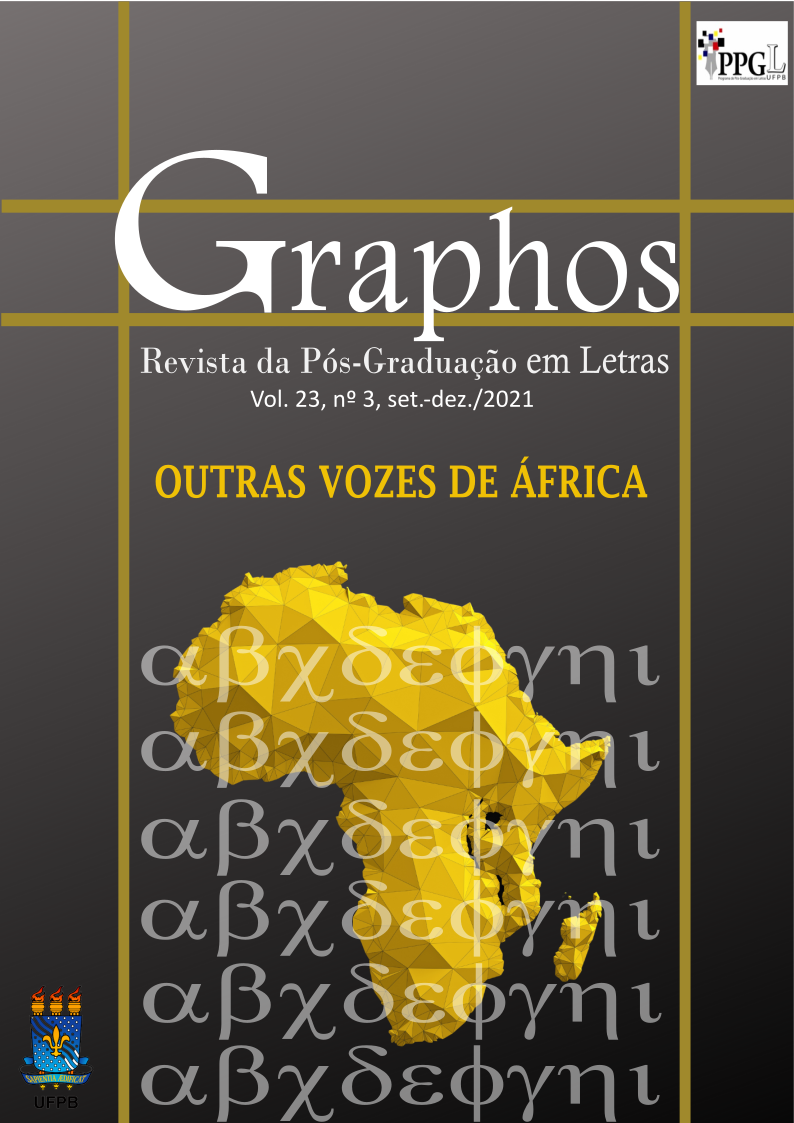Voices, views and post-colonial experiences of somali women in The orchard of lost souls, by Nadifa Mohamed
DOI:
https://doi.org/10.22478/ufpb.1516-1536.2021v23n3.60487Keywords:
Post-colonial studies, Feminine memories, Somali women, African literatures, Somali voicesAbstract
The Orchard of Lost Souls is an African novel written in English. The main plot unfolds mainly through the voices, life experiences and eyes of three Somali characters, namely, Deqo, Filsan, and Kawsar. The narrative portrays a fragmented post-colonial Somalia, characterized by foreign political influence and local conflicts. It is in this adverse, and many times unpredictable, sociopolitical context that the three women, of different generations, seek to survive in their own particular ways. Their trajectories, characterized by multiples encounters and separations, past and present, take them to a journey of (re)discoveries and (re)constructions of an identity crossed by gender, age, and local and global sociocultural issues. This paper presents a brief analysis of the process of identity ruptures and the characters’ resignifications that are transculturally translated by Nadifa Mohamed’s poetic writing. The transcultural nature of Mohamed’s writing lies in the fact that she is a British writer born in Somalia. The reflections triggered by this brief analysis are supported by postcolonial and decolonial theories due to the need to identify and understand the issues mediated by literary discourse and forms of their representations. The paper reveals, among other things, the importance of Mohamed’s novel as an expressive and powerful means of retrieving and weaving historically erased female memories.
Downloads
References
AFRICA WATCH COMMITTEE. Somalia: A Government at War with Its Own People, 1990. Disponível em: https://www.hrw.org/report/1990/01/31/government-war-its-own-people/testimonies-about-killings-and-conflict-north. Acesso em: 07 ago. 2021.
BRANDÃO, Paulo Roberto Baqueiro. Excertos da geografia somali na literatura: uma apreciação da obra “O pomar das almas perdidas”. Geosul. Florianópolis, v. 33, n. 68, p. 350-368, set./dez. 2018. Disponível em: https://periodicos.ufsc.br/index.php/geosul/article/view/2177-5230.2018v33n68p350. Acesso em: 26 jun. 2019. DOI: https://doi.org/10.5007/2177-5230.2018v33n68p350
BUSBY, Margaret. (ed.). Daughters of Africa. New York: Ballentine Books, 1992.
BUSHRA, Judy el; GARDNER, Judith. Somalia – the Untold Story: The War Through the Eyes of Somali Women. London: Pluto Press, 2004.
HASSAN, Dahabo Farah.; ADAN, Amina H.; WARSAME, Amina Mohamoud. Somalia: Poetry as Resistance against Colonialism and Patriarchy. In: WIERINGA, Saskia. (ed.). Subversive Women: Women’s Movements in Africa, Asia, Latin America and the Caribbean. London and New Jersey: Zed Book Ltd, 1997. p. 165-182.
GLISSANT, Édouard. Introdução a uma poética da diversidade. Tradução Enilce do Carmo Albergaria Rocha. Juiz de Fora: Editora UFJF, 2005.
McDOWELL, Linda. Gender Identity & Place: Understanding Feminist Geographies. United Kingdom: Polity, 1999.
MBEMBE, Achille. As formas africanas de auto-inscrição. Estudos Afro-Asiáticos, São Paulo, ano 23, n. 1, p. 171-209. 2001a, Disponível em: http://www.scielo.br/scielo.php?pid=S0101-546X2001000100007&script=sci_abstract&tlng=pt. Acesso em: 09 jan. 2018. DOI: https://doi.org/10.1590/S0101-546X2001000100007
MOHAMED, Nadifa. Black Mamba Boy. New York: Picador, 2010.
MOHAMED, Nadifa. The Way to a New Somalia. Publicado em 4 mar. 2012a. The Guardian. Disponível em: https://www.theguardian.com/commentisfree/2012/mar/04/way-new-somalia-london-conference. Acesso em: 15 jan. 2018.
MOHAMED, Nadifa. Fragments of a Nation. Granta. Publicado em: 24 maio 2012b. Disponível em: https://granta.com/fragments-of-a-nation/. Acesso em: 20 jan. 2019.
MOHAMED, Nadifa. The Orchard of Lost Souls. New York: Picador, 2014.
MOHAMED, Nadifa. O pomar das almas perdidas. Tradução Otacílio Nunes. São Paulo: Tordesilhas, 2016.
ODUYOYE, Mercy Amba. Daughters of Anowa: African Women & Patriarchy. New York: Orbis Books, 1995.
OLIVIERA, Valeria Silva de. A Somália da Imaginação de Nadifa Mohamed: uma poética da diversidade. In: HENRIQUES, A.L.S.; MONTEIRO, M.C. (Org.). Escritos discentes em literaturas de língua inglesa. Rio de Janeiro: Letra Capital, 2018. p. 228-236.
OLIVEIRA, Valeria Silva de. Narrativas da diversidade africana: fragmentos, memória e resistência em Black Mamba Boy e The Orchard of Lost Souls, de Nadifa Mohamed e A Grain of Wheat, de Ngugi wa Thiong’o. 2019. 297f. Tese (Doutorado em Letras) – Universidade do Estado do Rio de Janeiro, Rio de Janeiro, 2019.
PEREGO, Elizabeth.M. Front and Center on the Global Stage: African Women in Contemporary Novels. In: ACHEBE, Nwando; ROBERTSON, Claire. (Ed.). Holding the World Together: African Women in Changing Perspective. United States of America: The University of Wisconsin Press, 2019. p. 21-39. DOI: https://doi.org/10.2307/j.ctvfjcxvh.5
ROLLMANN, Rhea. Nadifa Mohamed: writing the lives of Somalia’s women. Publicado em 23 jun. 2015. Disponível em: https://www.popmatters.com/194787-nadifa-mohamed-2495514628.html?rebelltitem=1#rebelltitem1. Acesso em: 06 jun. 2019.
SALGUEIRO, Maria Aparecida Andrade. Escritoras negras contemporâneas: estudos de narrativas – Estados Unidos e Brasil. Rio de Janeiro: Editora Caetés, 2004.
SANTOS, Boaventura de Souza. Para além do pensamento abissal: das linhas globais a uma ecologia de saberes. SANTOS, B. de S.; MENESES, M. P. Epistemologias do Sul. São Paulo: Cortez, 2010. p. 31-83.
THIONG’O, Ngugi. wa. Something Torn and New: An African Renaissance. New York: BasicCivitas Books, 2009.
Downloads
Published
Issue
Section
License
Copyright (c) 2021 Valeria Silva de Oliveira

This work is licensed under a Creative Commons Attribution 4.0 International License.







